Organisational Learning, Development Theories and Models Report
VerifiedAdded on 2023/01/12
|11
|3200
|53
Report
AI Summary
This report provides a comprehensive analysis of learning and development within an organisational context. It begins by defining and differentiating between organisational learning and learning organisations, highlighting their significance in human resource management. The report then explores the importance of learning and development, emphasizing its role in high-performance working, skill enhancement, competitive advantage, and adaptability to change. A significant portion of the report is dedicated to a critical evaluation of various learning development theories and models, including the Cognitive Theory of Multimedia Learning, Social Learning Theory, and Active Experimentation. Each theory is presented with an overview, followed by a critical evaluation of its application to organisational learning and learning organisations, discussing their strengths, limitations, and potential impact on fostering change and competence within a company. The report concludes by summarizing the key findings and arguments presented throughout the analysis.
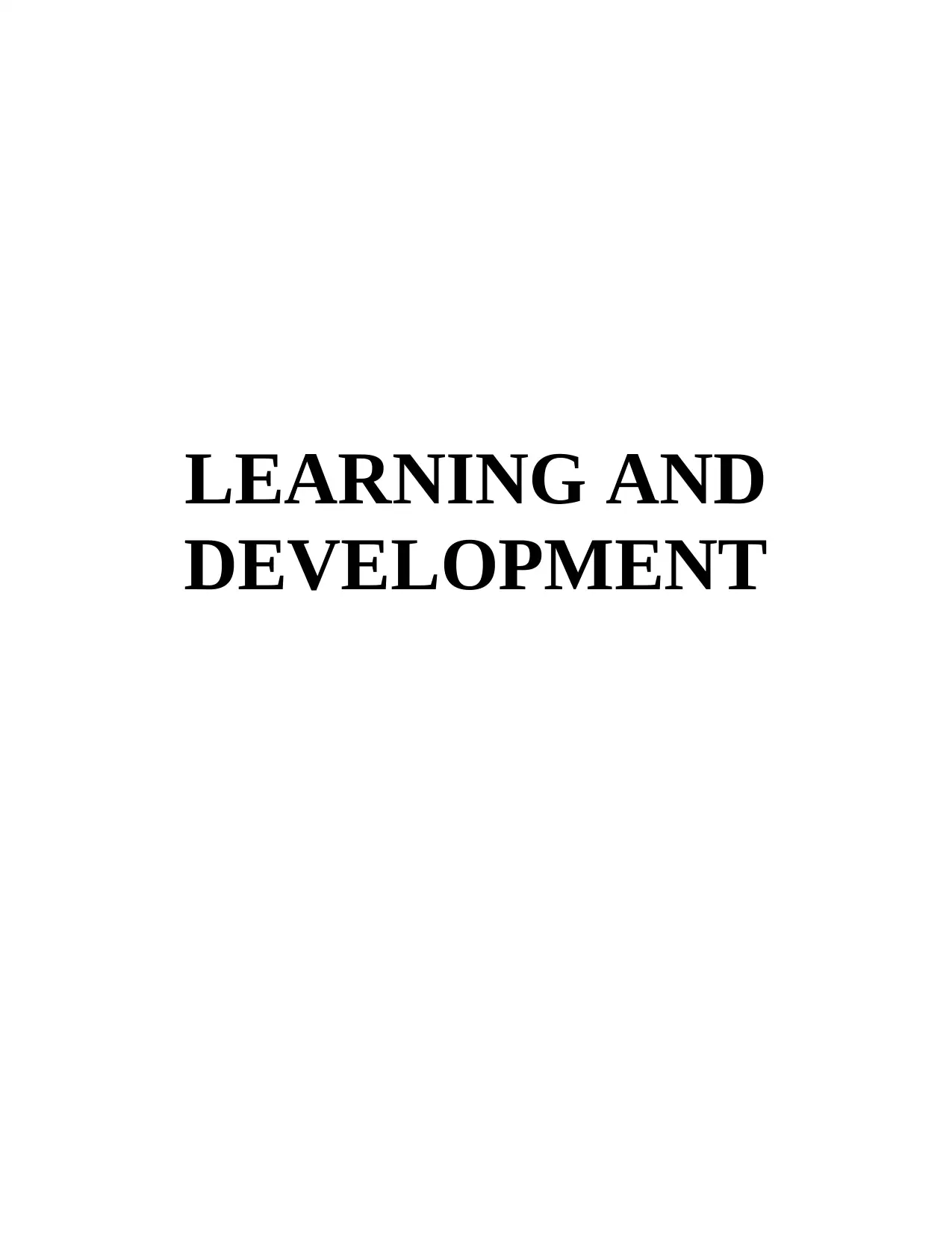
LEARNING AND
DEVELOPMENT
DEVELOPMENT
Paraphrase This Document
Need a fresh take? Get an instant paraphrase of this document with our AI Paraphraser
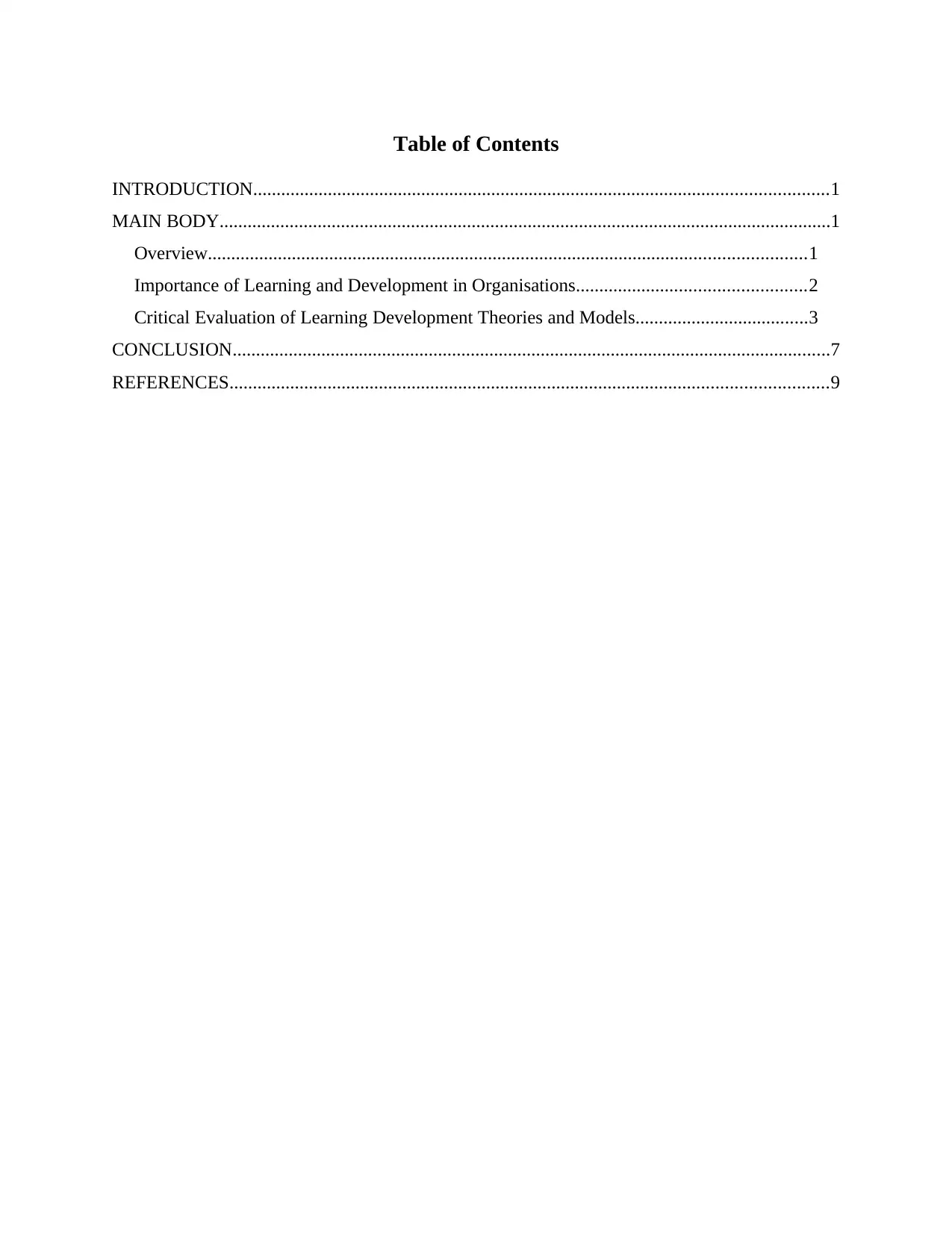
Table of Contents
INTRODUCTION...........................................................................................................................1
MAIN BODY...................................................................................................................................1
Overview................................................................................................................................1
Importance of Learning and Development in Organisations.................................................2
Critical Evaluation of Learning Development Theories and Models.....................................3
CONCLUSION................................................................................................................................7
REFERENCES................................................................................................................................9
INTRODUCTION...........................................................................................................................1
MAIN BODY...................................................................................................................................1
Overview................................................................................................................................1
Importance of Learning and Development in Organisations.................................................2
Critical Evaluation of Learning Development Theories and Models.....................................3
CONCLUSION................................................................................................................................7
REFERENCES................................................................................................................................9
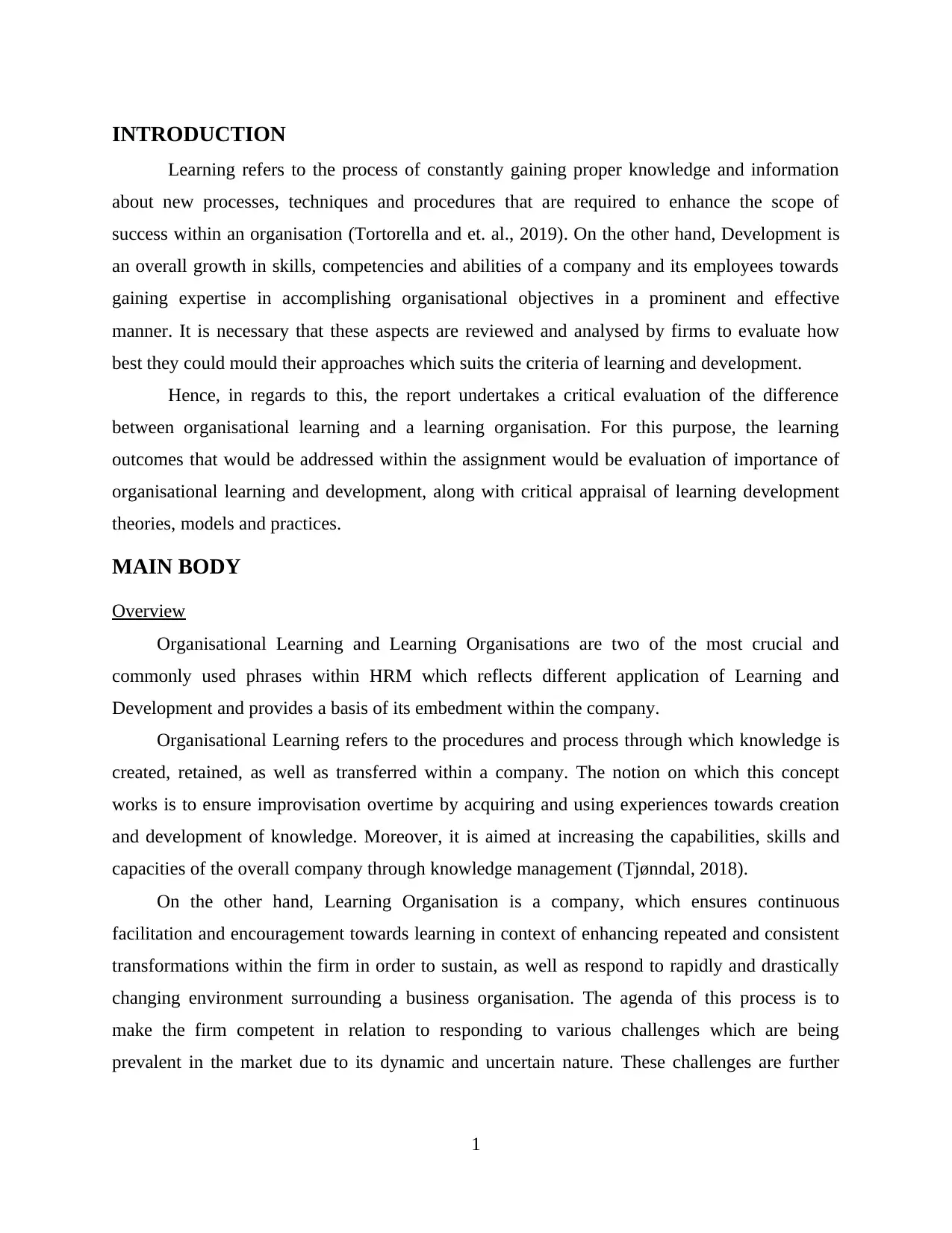
INTRODUCTION
Learning refers to the process of constantly gaining proper knowledge and information
about new processes, techniques and procedures that are required to enhance the scope of
success within an organisation (Tortorella and et. al., 2019). On the other hand, Development is
an overall growth in skills, competencies and abilities of a company and its employees towards
gaining expertise in accomplishing organisational objectives in a prominent and effective
manner. It is necessary that these aspects are reviewed and analysed by firms to evaluate how
best they could mould their approaches which suits the criteria of learning and development.
Hence, in regards to this, the report undertakes a critical evaluation of the difference
between organisational learning and a learning organisation. For this purpose, the learning
outcomes that would be addressed within the assignment would be evaluation of importance of
organisational learning and development, along with critical appraisal of learning development
theories, models and practices.
MAIN BODY
Overview
Organisational Learning and Learning Organisations are two of the most crucial and
commonly used phrases within HRM which reflects different application of Learning and
Development and provides a basis of its embedment within the company.
Organisational Learning refers to the procedures and process through which knowledge is
created, retained, as well as transferred within a company. The notion on which this concept
works is to ensure improvisation overtime by acquiring and using experiences towards creation
and development of knowledge. Moreover, it is aimed at increasing the capabilities, skills and
capacities of the overall company through knowledge management (Tjønndal, 2018).
On the other hand, Learning Organisation is a company, which ensures continuous
facilitation and encouragement towards learning in context of enhancing repeated and consistent
transformations within the firm in order to sustain, as well as respond to rapidly and drastically
changing environment surrounding a business organisation. The agenda of this process is to
make the firm competent in relation to responding to various challenges which are being
prevalent in the market due to its dynamic and uncertain nature. These challenges are further
1
Learning refers to the process of constantly gaining proper knowledge and information
about new processes, techniques and procedures that are required to enhance the scope of
success within an organisation (Tortorella and et. al., 2019). On the other hand, Development is
an overall growth in skills, competencies and abilities of a company and its employees towards
gaining expertise in accomplishing organisational objectives in a prominent and effective
manner. It is necessary that these aspects are reviewed and analysed by firms to evaluate how
best they could mould their approaches which suits the criteria of learning and development.
Hence, in regards to this, the report undertakes a critical evaluation of the difference
between organisational learning and a learning organisation. For this purpose, the learning
outcomes that would be addressed within the assignment would be evaluation of importance of
organisational learning and development, along with critical appraisal of learning development
theories, models and practices.
MAIN BODY
Overview
Organisational Learning and Learning Organisations are two of the most crucial and
commonly used phrases within HRM which reflects different application of Learning and
Development and provides a basis of its embedment within the company.
Organisational Learning refers to the procedures and process through which knowledge is
created, retained, as well as transferred within a company. The notion on which this concept
works is to ensure improvisation overtime by acquiring and using experiences towards creation
and development of knowledge. Moreover, it is aimed at increasing the capabilities, skills and
capacities of the overall company through knowledge management (Tjønndal, 2018).
On the other hand, Learning Organisation is a company, which ensures continuous
facilitation and encouragement towards learning in context of enhancing repeated and consistent
transformations within the firm in order to sustain, as well as respond to rapidly and drastically
changing environment surrounding a business organisation. The agenda of this process is to
make the firm competent in relation to responding to various challenges which are being
prevalent in the market due to its dynamic and uncertain nature. These challenges are further
1
⊘ This is a preview!⊘
Do you want full access?
Subscribe today to unlock all pages.

Trusted by 1+ million students worldwide
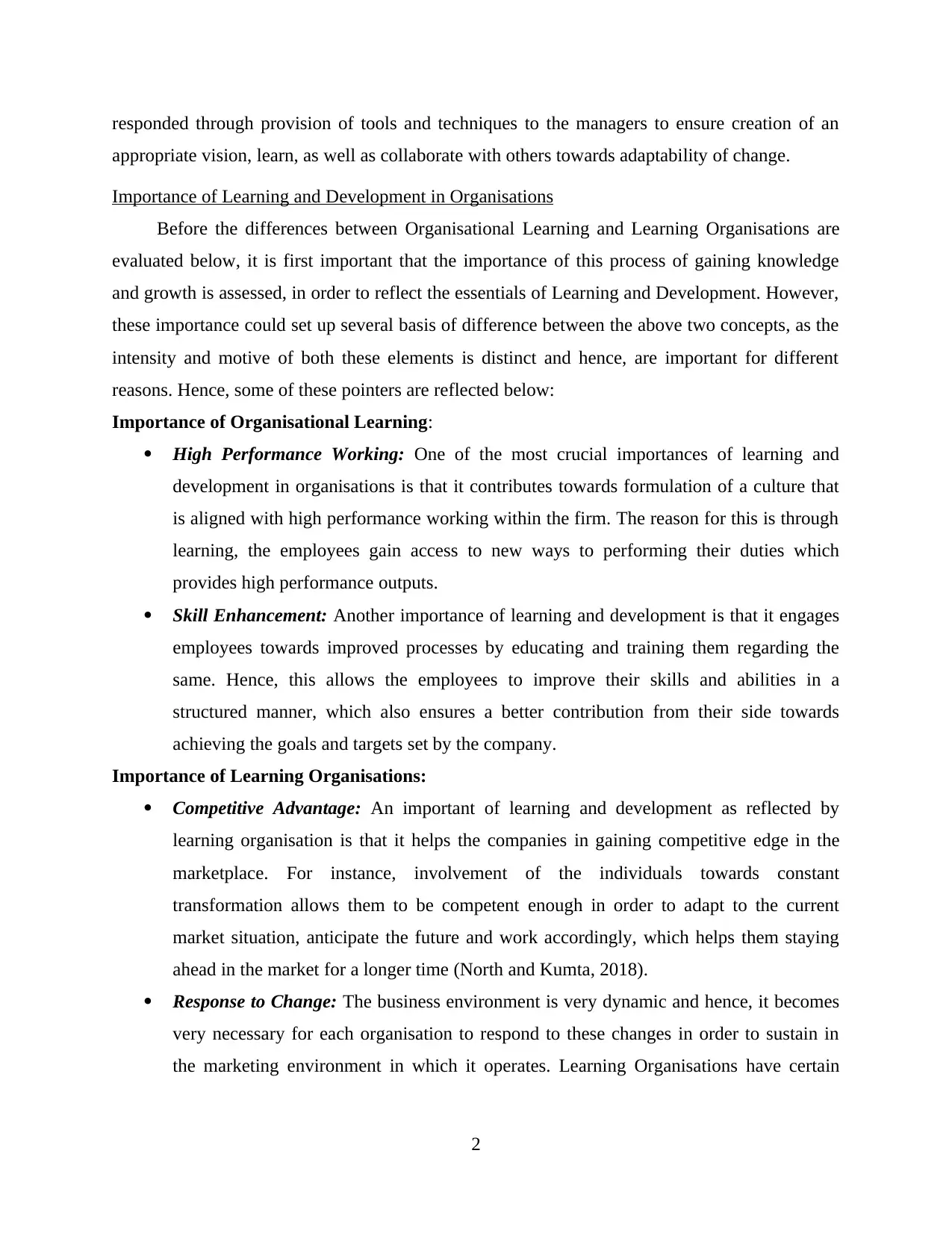
responded through provision of tools and techniques to the managers to ensure creation of an
appropriate vision, learn, as well as collaborate with others towards adaptability of change.
Importance of Learning and Development in Organisations
Before the differences between Organisational Learning and Learning Organisations are
evaluated below, it is first important that the importance of this process of gaining knowledge
and growth is assessed, in order to reflect the essentials of Learning and Development. However,
these importance could set up several basis of difference between the above two concepts, as the
intensity and motive of both these elements is distinct and hence, are important for different
reasons. Hence, some of these pointers are reflected below:
Importance of Organisational Learning:
High Performance Working: One of the most crucial importances of learning and
development in organisations is that it contributes towards formulation of a culture that
is aligned with high performance working within the firm. The reason for this is through
learning, the employees gain access to new ways to performing their duties which
provides high performance outputs.
Skill Enhancement: Another importance of learning and development is that it engages
employees towards improved processes by educating and training them regarding the
same. Hence, this allows the employees to improve their skills and abilities in a
structured manner, which also ensures a better contribution from their side towards
achieving the goals and targets set by the company.
Importance of Learning Organisations:
Competitive Advantage: An important of learning and development as reflected by
learning organisation is that it helps the companies in gaining competitive edge in the
marketplace. For instance, involvement of the individuals towards constant
transformation allows them to be competent enough in order to adapt to the current
market situation, anticipate the future and work accordingly, which helps them staying
ahead in the market for a longer time (North and Kumta, 2018).
Response to Change: The business environment is very dynamic and hence, it becomes
very necessary for each organisation to respond to these changes in order to sustain in
the marketing environment in which it operates. Learning Organisations have certain
2
appropriate vision, learn, as well as collaborate with others towards adaptability of change.
Importance of Learning and Development in Organisations
Before the differences between Organisational Learning and Learning Organisations are
evaluated below, it is first important that the importance of this process of gaining knowledge
and growth is assessed, in order to reflect the essentials of Learning and Development. However,
these importance could set up several basis of difference between the above two concepts, as the
intensity and motive of both these elements is distinct and hence, are important for different
reasons. Hence, some of these pointers are reflected below:
Importance of Organisational Learning:
High Performance Working: One of the most crucial importances of learning and
development in organisations is that it contributes towards formulation of a culture that
is aligned with high performance working within the firm. The reason for this is through
learning, the employees gain access to new ways to performing their duties which
provides high performance outputs.
Skill Enhancement: Another importance of learning and development is that it engages
employees towards improved processes by educating and training them regarding the
same. Hence, this allows the employees to improve their skills and abilities in a
structured manner, which also ensures a better contribution from their side towards
achieving the goals and targets set by the company.
Importance of Learning Organisations:
Competitive Advantage: An important of learning and development as reflected by
learning organisation is that it helps the companies in gaining competitive edge in the
marketplace. For instance, involvement of the individuals towards constant
transformation allows them to be competent enough in order to adapt to the current
market situation, anticipate the future and work accordingly, which helps them staying
ahead in the market for a longer time (North and Kumta, 2018).
Response to Change: The business environment is very dynamic and hence, it becomes
very necessary for each organisation to respond to these changes in order to sustain in
the marketing environment in which it operates. Learning Organisations have certain
2
Paraphrase This Document
Need a fresh take? Get an instant paraphrase of this document with our AI Paraphraser
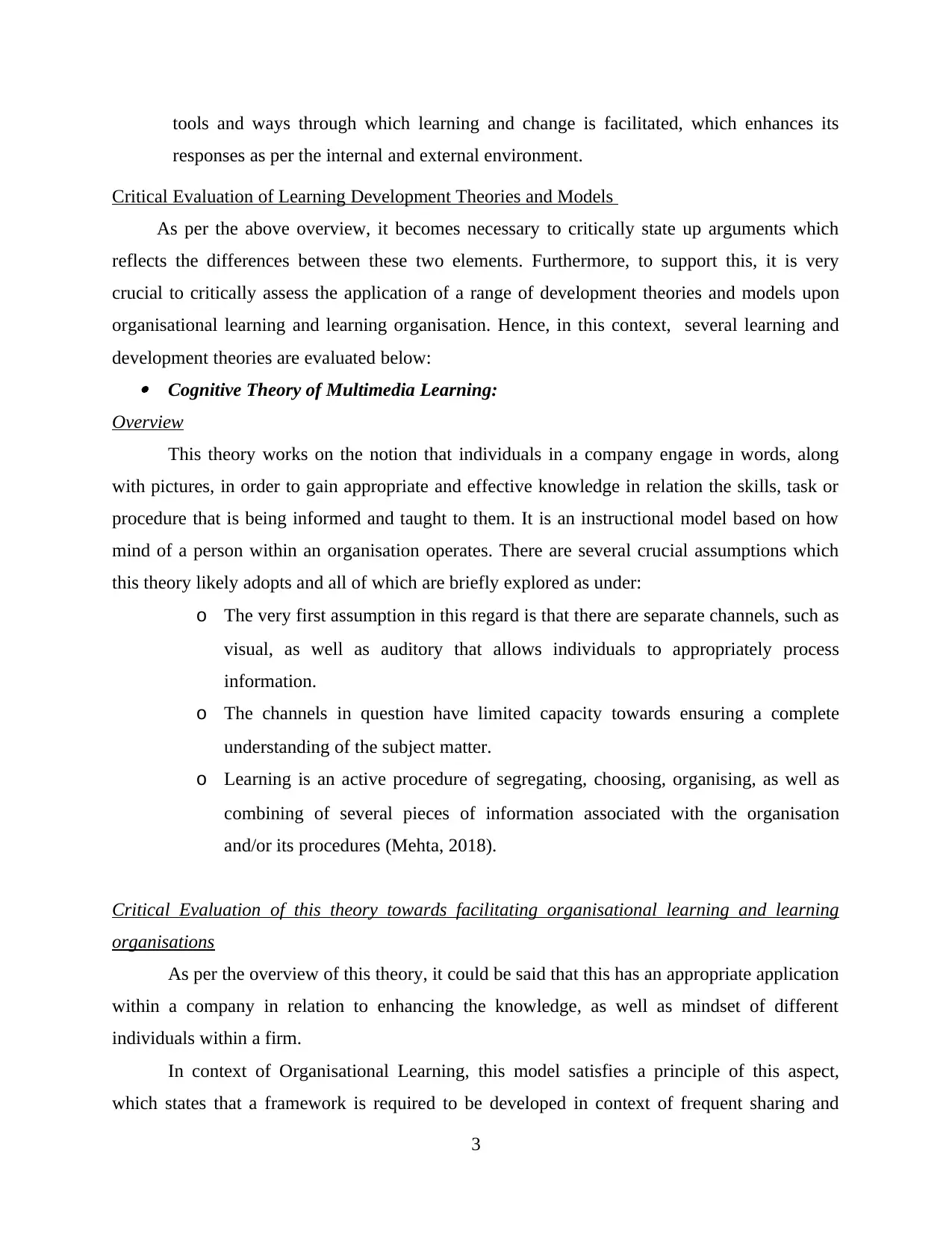
tools and ways through which learning and change is facilitated, which enhances its
responses as per the internal and external environment.
Critical Evaluation of Learning Development Theories and Models
As per the above overview, it becomes necessary to critically state up arguments which
reflects the differences between these two elements. Furthermore, to support this, it is very
crucial to critically assess the application of a range of development theories and models upon
organisational learning and learning organisation. Hence, in this context, several learning and
development theories are evaluated below: Cognitive Theory of Multimedia Learning:
Overview
This theory works on the notion that individuals in a company engage in words, along
with pictures, in order to gain appropriate and effective knowledge in relation the skills, task or
procedure that is being informed and taught to them. It is an instructional model based on how
mind of a person within an organisation operates. There are several crucial assumptions which
this theory likely adopts and all of which are briefly explored as under:
o The very first assumption in this regard is that there are separate channels, such as
visual, as well as auditory that allows individuals to appropriately process
information.
o The channels in question have limited capacity towards ensuring a complete
understanding of the subject matter.
o Learning is an active procedure of segregating, choosing, organising, as well as
combining of several pieces of information associated with the organisation
and/or its procedures (Mehta, 2018).
Critical Evaluation of this theory towards facilitating organisational learning and learning
organisations
As per the overview of this theory, it could be said that this has an appropriate application
within a company in relation to enhancing the knowledge, as well as mindset of different
individuals within a firm.
In context of Organisational Learning, this model satisfies a principle of this aspect,
which states that a framework is required to be developed in context of frequent sharing and
3
responses as per the internal and external environment.
Critical Evaluation of Learning Development Theories and Models
As per the above overview, it becomes necessary to critically state up arguments which
reflects the differences between these two elements. Furthermore, to support this, it is very
crucial to critically assess the application of a range of development theories and models upon
organisational learning and learning organisation. Hence, in this context, several learning and
development theories are evaluated below: Cognitive Theory of Multimedia Learning:
Overview
This theory works on the notion that individuals in a company engage in words, along
with pictures, in order to gain appropriate and effective knowledge in relation the skills, task or
procedure that is being informed and taught to them. It is an instructional model based on how
mind of a person within an organisation operates. There are several crucial assumptions which
this theory likely adopts and all of which are briefly explored as under:
o The very first assumption in this regard is that there are separate channels, such as
visual, as well as auditory that allows individuals to appropriately process
information.
o The channels in question have limited capacity towards ensuring a complete
understanding of the subject matter.
o Learning is an active procedure of segregating, choosing, organising, as well as
combining of several pieces of information associated with the organisation
and/or its procedures (Mehta, 2018).
Critical Evaluation of this theory towards facilitating organisational learning and learning
organisations
As per the overview of this theory, it could be said that this has an appropriate application
within a company in relation to enhancing the knowledge, as well as mindset of different
individuals within a firm.
In context of Organisational Learning, this model satisfies a principle of this aspect,
which states that a framework is required to be developed in context of frequent sharing and
3
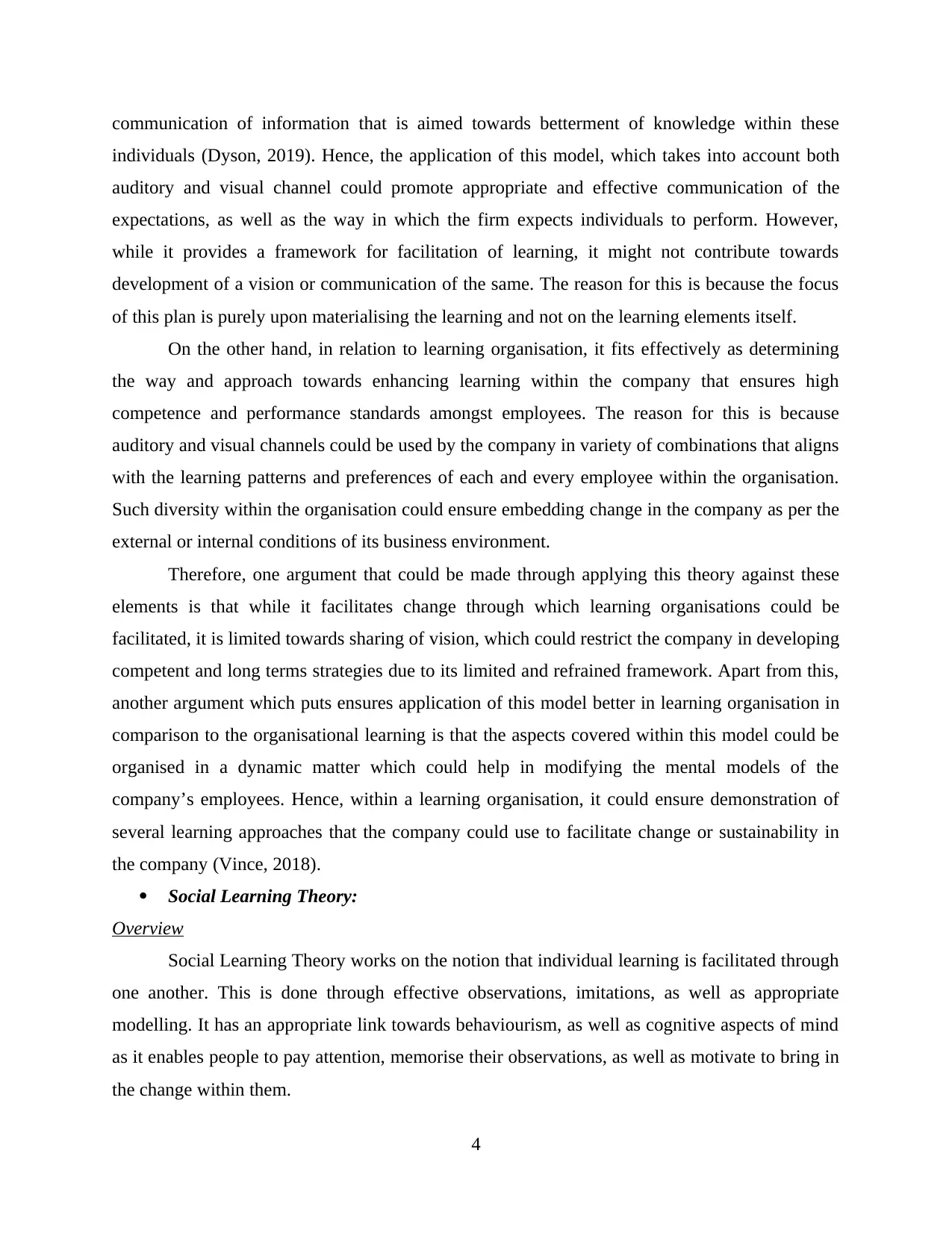
communication of information that is aimed towards betterment of knowledge within these
individuals (Dyson, 2019). Hence, the application of this model, which takes into account both
auditory and visual channel could promote appropriate and effective communication of the
expectations, as well as the way in which the firm expects individuals to perform. However,
while it provides a framework for facilitation of learning, it might not contribute towards
development of a vision or communication of the same. The reason for this is because the focus
of this plan is purely upon materialising the learning and not on the learning elements itself.
On the other hand, in relation to learning organisation, it fits effectively as determining
the way and approach towards enhancing learning within the company that ensures high
competence and performance standards amongst employees. The reason for this is because
auditory and visual channels could be used by the company in variety of combinations that aligns
with the learning patterns and preferences of each and every employee within the organisation.
Such diversity within the organisation could ensure embedding change in the company as per the
external or internal conditions of its business environment.
Therefore, one argument that could be made through applying this theory against these
elements is that while it facilitates change through which learning organisations could be
facilitated, it is limited towards sharing of vision, which could restrict the company in developing
competent and long terms strategies due to its limited and refrained framework. Apart from this,
another argument which puts ensures application of this model better in learning organisation in
comparison to the organisational learning is that the aspects covered within this model could be
organised in a dynamic matter which could help in modifying the mental models of the
company’s employees. Hence, within a learning organisation, it could ensure demonstration of
several learning approaches that the company could use to facilitate change or sustainability in
the company (Vince, 2018).
Social Learning Theory:
Overview
Social Learning Theory works on the notion that individual learning is facilitated through
one another. This is done through effective observations, imitations, as well as appropriate
modelling. It has an appropriate link towards behaviourism, as well as cognitive aspects of mind
as it enables people to pay attention, memorise their observations, as well as motivate to bring in
the change within them.
4
individuals (Dyson, 2019). Hence, the application of this model, which takes into account both
auditory and visual channel could promote appropriate and effective communication of the
expectations, as well as the way in which the firm expects individuals to perform. However,
while it provides a framework for facilitation of learning, it might not contribute towards
development of a vision or communication of the same. The reason for this is because the focus
of this plan is purely upon materialising the learning and not on the learning elements itself.
On the other hand, in relation to learning organisation, it fits effectively as determining
the way and approach towards enhancing learning within the company that ensures high
competence and performance standards amongst employees. The reason for this is because
auditory and visual channels could be used by the company in variety of combinations that aligns
with the learning patterns and preferences of each and every employee within the organisation.
Such diversity within the organisation could ensure embedding change in the company as per the
external or internal conditions of its business environment.
Therefore, one argument that could be made through applying this theory against these
elements is that while it facilitates change through which learning organisations could be
facilitated, it is limited towards sharing of vision, which could restrict the company in developing
competent and long terms strategies due to its limited and refrained framework. Apart from this,
another argument which puts ensures application of this model better in learning organisation in
comparison to the organisational learning is that the aspects covered within this model could be
organised in a dynamic matter which could help in modifying the mental models of the
company’s employees. Hence, within a learning organisation, it could ensure demonstration of
several learning approaches that the company could use to facilitate change or sustainability in
the company (Vince, 2018).
Social Learning Theory:
Overview
Social Learning Theory works on the notion that individual learning is facilitated through
one another. This is done through effective observations, imitations, as well as appropriate
modelling. It has an appropriate link towards behaviourism, as well as cognitive aspects of mind
as it enables people to pay attention, memorise their observations, as well as motivate to bring in
the change within them.
4
⊘ This is a preview!⊘
Do you want full access?
Subscribe today to unlock all pages.

Trusted by 1+ million students worldwide
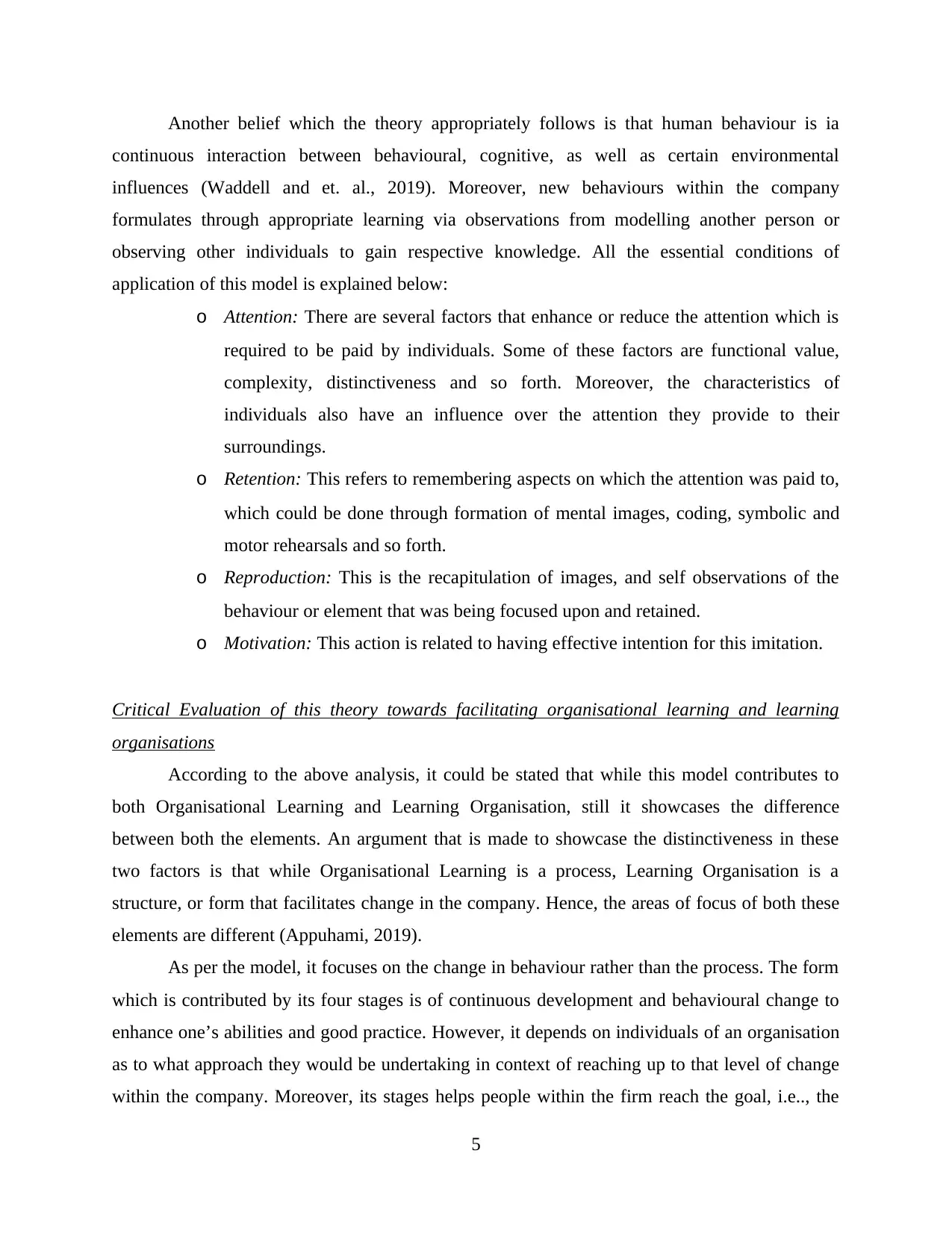
Another belief which the theory appropriately follows is that human behaviour is ia
continuous interaction between behavioural, cognitive, as well as certain environmental
influences (Waddell and et. al., 2019). Moreover, new behaviours within the company
formulates through appropriate learning via observations from modelling another person or
observing other individuals to gain respective knowledge. All the essential conditions of
application of this model is explained below:
o Attention: There are several factors that enhance or reduce the attention which is
required to be paid by individuals. Some of these factors are functional value,
complexity, distinctiveness and so forth. Moreover, the characteristics of
individuals also have an influence over the attention they provide to their
surroundings.
o Retention: This refers to remembering aspects on which the attention was paid to,
which could be done through formation of mental images, coding, symbolic and
motor rehearsals and so forth.
o Reproduction: This is the recapitulation of images, and self observations of the
behaviour or element that was being focused upon and retained.
o Motivation: This action is related to having effective intention for this imitation.
Critical Evaluation of this theory towards facilitating organisational learning and learning
organisations
According to the above analysis, it could be stated that while this model contributes to
both Organisational Learning and Learning Organisation, still it showcases the difference
between both the elements. An argument that is made to showcase the distinctiveness in these
two factors is that while Organisational Learning is a process, Learning Organisation is a
structure, or form that facilitates change in the company. Hence, the areas of focus of both these
elements are different (Appuhami, 2019).
As per the model, it focuses on the change in behaviour rather than the process. The form
which is contributed by its four stages is of continuous development and behavioural change to
enhance one’s abilities and good practice. However, it depends on individuals of an organisation
as to what approach they would be undertaking in context of reaching up to that level of change
within the company. Moreover, its stages helps people within the firm reach the goal, i.e.., the
5
continuous interaction between behavioural, cognitive, as well as certain environmental
influences (Waddell and et. al., 2019). Moreover, new behaviours within the company
formulates through appropriate learning via observations from modelling another person or
observing other individuals to gain respective knowledge. All the essential conditions of
application of this model is explained below:
o Attention: There are several factors that enhance or reduce the attention which is
required to be paid by individuals. Some of these factors are functional value,
complexity, distinctiveness and so forth. Moreover, the characteristics of
individuals also have an influence over the attention they provide to their
surroundings.
o Retention: This refers to remembering aspects on which the attention was paid to,
which could be done through formation of mental images, coding, symbolic and
motor rehearsals and so forth.
o Reproduction: This is the recapitulation of images, and self observations of the
behaviour or element that was being focused upon and retained.
o Motivation: This action is related to having effective intention for this imitation.
Critical Evaluation of this theory towards facilitating organisational learning and learning
organisations
According to the above analysis, it could be stated that while this model contributes to
both Organisational Learning and Learning Organisation, still it showcases the difference
between both the elements. An argument that is made to showcase the distinctiveness in these
two factors is that while Organisational Learning is a process, Learning Organisation is a
structure, or form that facilitates change in the company. Hence, the areas of focus of both these
elements are different (Appuhami, 2019).
As per the model, it focuses on the change in behaviour rather than the process. The form
which is contributed by its four stages is of continuous development and behavioural change to
enhance one’s abilities and good practice. However, it depends on individuals of an organisation
as to what approach they would be undertaking in context of reaching up to that level of change
within the company. Moreover, its stages helps people within the firm reach the goal, i.e.., the
5
Paraphrase This Document
Need a fresh take? Get an instant paraphrase of this document with our AI Paraphraser
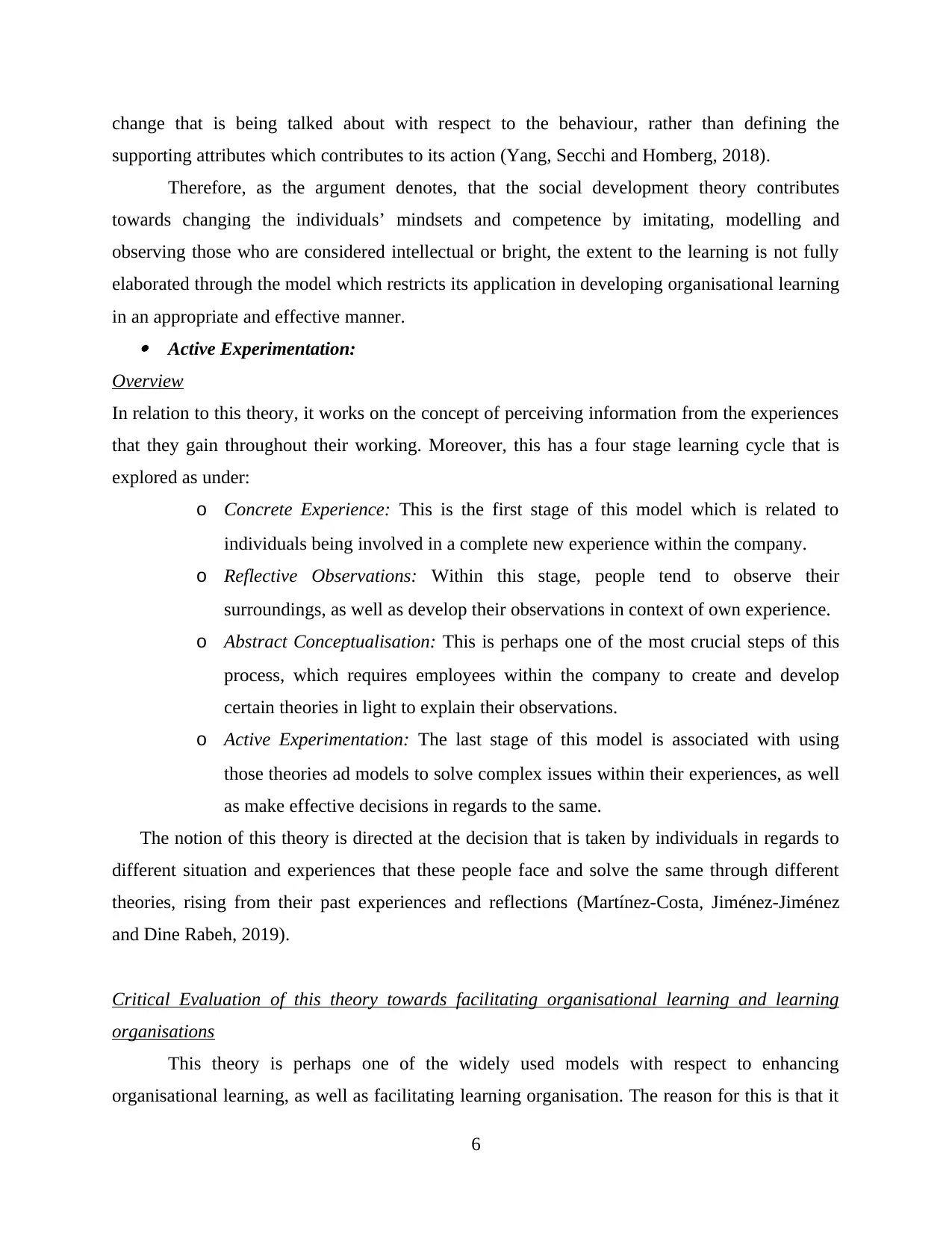
change that is being talked about with respect to the behaviour, rather than defining the
supporting attributes which contributes to its action (Yang, Secchi and Homberg, 2018).
Therefore, as the argument denotes, that the social development theory contributes
towards changing the individuals’ mindsets and competence by imitating, modelling and
observing those who are considered intellectual or bright, the extent to the learning is not fully
elaborated through the model which restricts its application in developing organisational learning
in an appropriate and effective manner. Active Experimentation:
Overview
In relation to this theory, it works on the concept of perceiving information from the experiences
that they gain throughout their working. Moreover, this has a four stage learning cycle that is
explored as under:
o Concrete Experience: This is the first stage of this model which is related to
individuals being involved in a complete new experience within the company.
o Reflective Observations: Within this stage, people tend to observe their
surroundings, as well as develop their observations in context of own experience.
o Abstract Conceptualisation: This is perhaps one of the most crucial steps of this
process, which requires employees within the company to create and develop
certain theories in light to explain their observations.
o Active Experimentation: The last stage of this model is associated with using
those theories ad models to solve complex issues within their experiences, as well
as make effective decisions in regards to the same.
The notion of this theory is directed at the decision that is taken by individuals in regards to
different situation and experiences that these people face and solve the same through different
theories, rising from their past experiences and reflections (Martínez-Costa, Jiménez-Jiménez
and Dine Rabeh, 2019).
Critical Evaluation of this theory towards facilitating organisational learning and learning
organisations
This theory is perhaps one of the widely used models with respect to enhancing
organisational learning, as well as facilitating learning organisation. The reason for this is that it
6
supporting attributes which contributes to its action (Yang, Secchi and Homberg, 2018).
Therefore, as the argument denotes, that the social development theory contributes
towards changing the individuals’ mindsets and competence by imitating, modelling and
observing those who are considered intellectual or bright, the extent to the learning is not fully
elaborated through the model which restricts its application in developing organisational learning
in an appropriate and effective manner. Active Experimentation:
Overview
In relation to this theory, it works on the concept of perceiving information from the experiences
that they gain throughout their working. Moreover, this has a four stage learning cycle that is
explored as under:
o Concrete Experience: This is the first stage of this model which is related to
individuals being involved in a complete new experience within the company.
o Reflective Observations: Within this stage, people tend to observe their
surroundings, as well as develop their observations in context of own experience.
o Abstract Conceptualisation: This is perhaps one of the most crucial steps of this
process, which requires employees within the company to create and develop
certain theories in light to explain their observations.
o Active Experimentation: The last stage of this model is associated with using
those theories ad models to solve complex issues within their experiences, as well
as make effective decisions in regards to the same.
The notion of this theory is directed at the decision that is taken by individuals in regards to
different situation and experiences that these people face and solve the same through different
theories, rising from their past experiences and reflections (Martínez-Costa, Jiménez-Jiménez
and Dine Rabeh, 2019).
Critical Evaluation of this theory towards facilitating organisational learning and learning
organisations
This theory is perhaps one of the widely used models with respect to enhancing
organisational learning, as well as facilitating learning organisation. The reason for this is that it
6
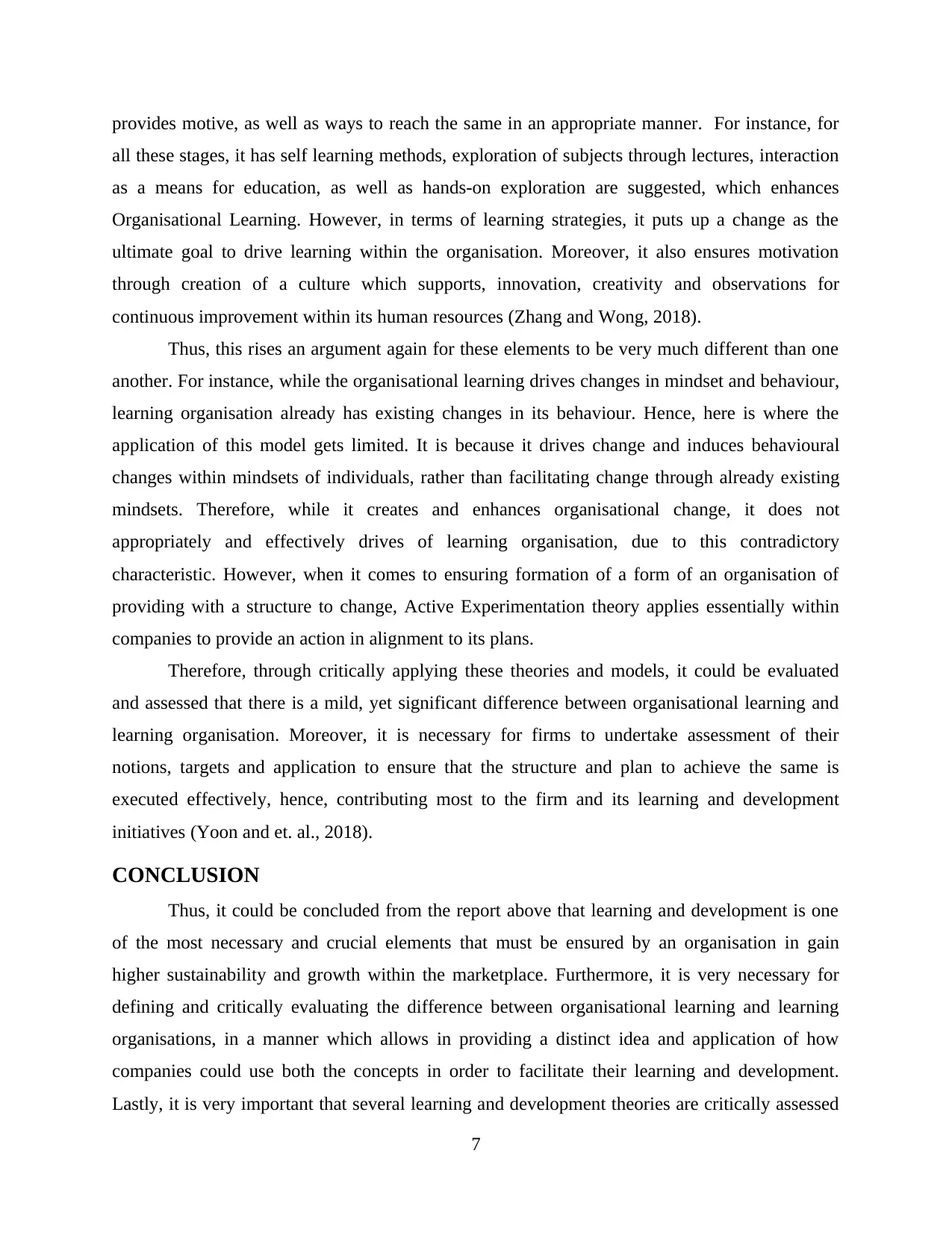
provides motive, as well as ways to reach the same in an appropriate manner. For instance, for
all these stages, it has self learning methods, exploration of subjects through lectures, interaction
as a means for education, as well as hands-on exploration are suggested, which enhances
Organisational Learning. However, in terms of learning strategies, it puts up a change as the
ultimate goal to drive learning within the organisation. Moreover, it also ensures motivation
through creation of a culture which supports, innovation, creativity and observations for
continuous improvement within its human resources (Zhang and Wong, 2018).
Thus, this rises an argument again for these elements to be very much different than one
another. For instance, while the organisational learning drives changes in mindset and behaviour,
learning organisation already has existing changes in its behaviour. Hence, here is where the
application of this model gets limited. It is because it drives change and induces behavioural
changes within mindsets of individuals, rather than facilitating change through already existing
mindsets. Therefore, while it creates and enhances organisational change, it does not
appropriately and effectively drives of learning organisation, due to this contradictory
characteristic. However, when it comes to ensuring formation of a form of an organisation of
providing with a structure to change, Active Experimentation theory applies essentially within
companies to provide an action in alignment to its plans.
Therefore, through critically applying these theories and models, it could be evaluated
and assessed that there is a mild, yet significant difference between organisational learning and
learning organisation. Moreover, it is necessary for firms to undertake assessment of their
notions, targets and application to ensure that the structure and plan to achieve the same is
executed effectively, hence, contributing most to the firm and its learning and development
initiatives (Yoon and et. al., 2018).
CONCLUSION
Thus, it could be concluded from the report above that learning and development is one
of the most necessary and crucial elements that must be ensured by an organisation in gain
higher sustainability and growth within the marketplace. Furthermore, it is very necessary for
defining and critically evaluating the difference between organisational learning and learning
organisations, in a manner which allows in providing a distinct idea and application of how
companies could use both the concepts in order to facilitate their learning and development.
Lastly, it is very important that several learning and development theories are critically assessed
7
all these stages, it has self learning methods, exploration of subjects through lectures, interaction
as a means for education, as well as hands-on exploration are suggested, which enhances
Organisational Learning. However, in terms of learning strategies, it puts up a change as the
ultimate goal to drive learning within the organisation. Moreover, it also ensures motivation
through creation of a culture which supports, innovation, creativity and observations for
continuous improvement within its human resources (Zhang and Wong, 2018).
Thus, this rises an argument again for these elements to be very much different than one
another. For instance, while the organisational learning drives changes in mindset and behaviour,
learning organisation already has existing changes in its behaviour. Hence, here is where the
application of this model gets limited. It is because it drives change and induces behavioural
changes within mindsets of individuals, rather than facilitating change through already existing
mindsets. Therefore, while it creates and enhances organisational change, it does not
appropriately and effectively drives of learning organisation, due to this contradictory
characteristic. However, when it comes to ensuring formation of a form of an organisation of
providing with a structure to change, Active Experimentation theory applies essentially within
companies to provide an action in alignment to its plans.
Therefore, through critically applying these theories and models, it could be evaluated
and assessed that there is a mild, yet significant difference between organisational learning and
learning organisation. Moreover, it is necessary for firms to undertake assessment of their
notions, targets and application to ensure that the structure and plan to achieve the same is
executed effectively, hence, contributing most to the firm and its learning and development
initiatives (Yoon and et. al., 2018).
CONCLUSION
Thus, it could be concluded from the report above that learning and development is one
of the most necessary and crucial elements that must be ensured by an organisation in gain
higher sustainability and growth within the marketplace. Furthermore, it is very necessary for
defining and critically evaluating the difference between organisational learning and learning
organisations, in a manner which allows in providing a distinct idea and application of how
companies could use both the concepts in order to facilitate their learning and development.
Lastly, it is very important that several learning and development theories are critically assessed
7
⊘ This is a preview!⊘
Do you want full access?
Subscribe today to unlock all pages.

Trusted by 1+ million students worldwide

to determine their usage and implementation within companies in context of organisational
learning and learning organisations.
8
learning and learning organisations.
8
Paraphrase This Document
Need a fresh take? Get an instant paraphrase of this document with our AI Paraphraser
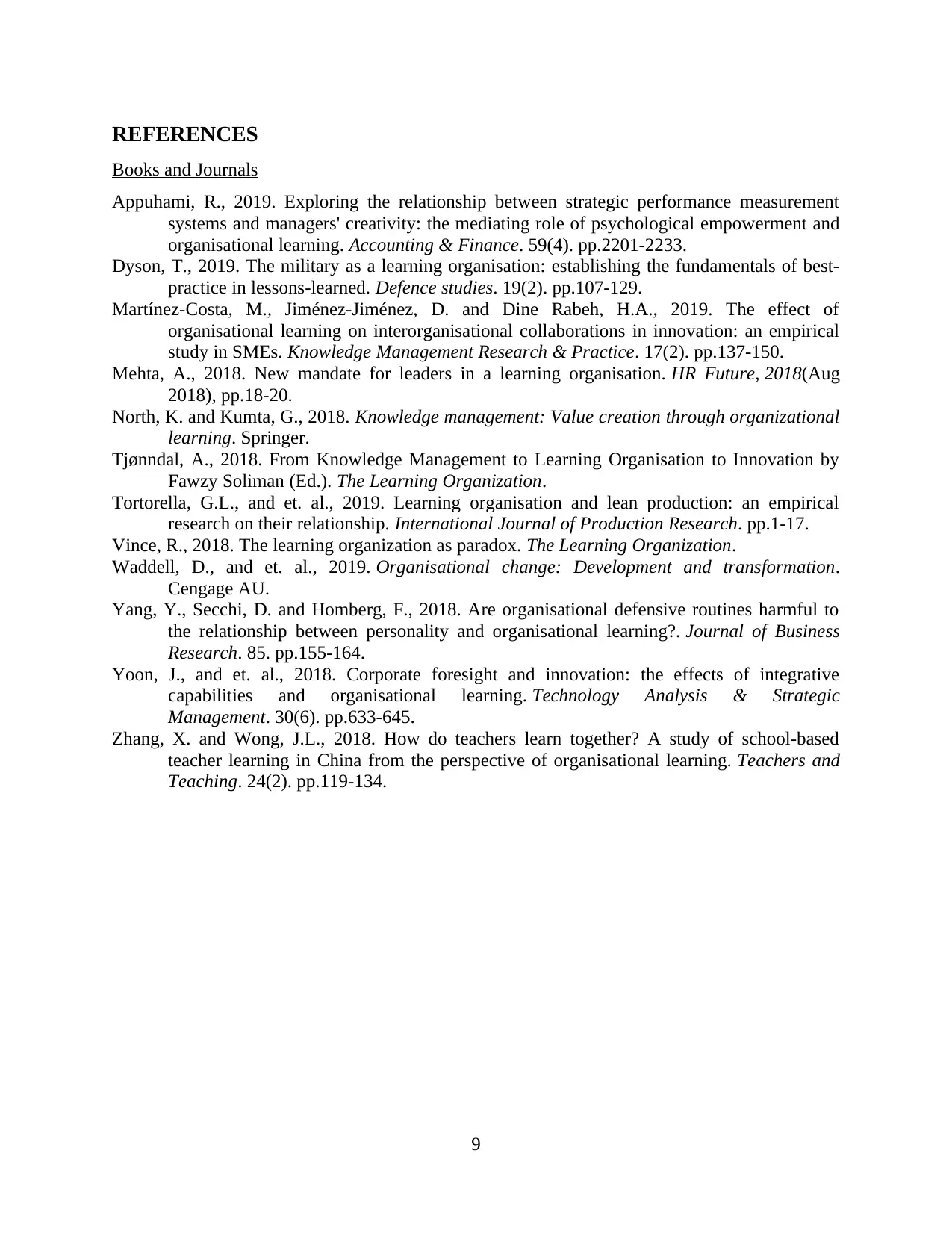
REFERENCES
Books and Journals
Appuhami, R., 2019. Exploring the relationship between strategic performance measurement
systems and managers' creativity: the mediating role of psychological empowerment and
organisational learning. Accounting & Finance. 59(4). pp.2201-2233.
Dyson, T., 2019. The military as a learning organisation: establishing the fundamentals of best-
practice in lessons-learned. Defence studies. 19(2). pp.107-129.
Martínez-Costa, M., Jiménez-Jiménez, D. and Dine Rabeh, H.A., 2019. The effect of
organisational learning on interorganisational collaborations in innovation: an empirical
study in SMEs. Knowledge Management Research & Practice. 17(2). pp.137-150.
Mehta, A., 2018. New mandate for leaders in a learning organisation. HR Future, 2018(Aug
2018), pp.18-20.
North, K. and Kumta, G., 2018. Knowledge management: Value creation through organizational
learning. Springer.
Tjønndal, A., 2018. From Knowledge Management to Learning Organisation to Innovation by
Fawzy Soliman (Ed.). The Learning Organization.
Tortorella, G.L., and et. al., 2019. Learning organisation and lean production: an empirical
research on their relationship. International Journal of Production Research. pp.1-17.
Vince, R., 2018. The learning organization as paradox. The Learning Organization.
Waddell, D., and et. al., 2019. Organisational change: Development and transformation.
Cengage AU.
Yang, Y., Secchi, D. and Homberg, F., 2018. Are organisational defensive routines harmful to
the relationship between personality and organisational learning?. Journal of Business
Research. 85. pp.155-164.
Yoon, J., and et. al., 2018. Corporate foresight and innovation: the effects of integrative
capabilities and organisational learning. Technology Analysis & Strategic
Management. 30(6). pp.633-645.
Zhang, X. and Wong, J.L., 2018. How do teachers learn together? A study of school-based
teacher learning in China from the perspective of organisational learning. Teachers and
Teaching. 24(2). pp.119-134.
9
Books and Journals
Appuhami, R., 2019. Exploring the relationship between strategic performance measurement
systems and managers' creativity: the mediating role of psychological empowerment and
organisational learning. Accounting & Finance. 59(4). pp.2201-2233.
Dyson, T., 2019. The military as a learning organisation: establishing the fundamentals of best-
practice in lessons-learned. Defence studies. 19(2). pp.107-129.
Martínez-Costa, M., Jiménez-Jiménez, D. and Dine Rabeh, H.A., 2019. The effect of
organisational learning on interorganisational collaborations in innovation: an empirical
study in SMEs. Knowledge Management Research & Practice. 17(2). pp.137-150.
Mehta, A., 2018. New mandate for leaders in a learning organisation. HR Future, 2018(Aug
2018), pp.18-20.
North, K. and Kumta, G., 2018. Knowledge management: Value creation through organizational
learning. Springer.
Tjønndal, A., 2018. From Knowledge Management to Learning Organisation to Innovation by
Fawzy Soliman (Ed.). The Learning Organization.
Tortorella, G.L., and et. al., 2019. Learning organisation and lean production: an empirical
research on their relationship. International Journal of Production Research. pp.1-17.
Vince, R., 2018. The learning organization as paradox. The Learning Organization.
Waddell, D., and et. al., 2019. Organisational change: Development and transformation.
Cengage AU.
Yang, Y., Secchi, D. and Homberg, F., 2018. Are organisational defensive routines harmful to
the relationship between personality and organisational learning?. Journal of Business
Research. 85. pp.155-164.
Yoon, J., and et. al., 2018. Corporate foresight and innovation: the effects of integrative
capabilities and organisational learning. Technology Analysis & Strategic
Management. 30(6). pp.633-645.
Zhang, X. and Wong, J.L., 2018. How do teachers learn together? A study of school-based
teacher learning in China from the perspective of organisational learning. Teachers and
Teaching. 24(2). pp.119-134.
9
1 out of 11
Related Documents
Your All-in-One AI-Powered Toolkit for Academic Success.
+13062052269
info@desklib.com
Available 24*7 on WhatsApp / Email
![[object Object]](/_next/static/media/star-bottom.7253800d.svg)
Unlock your academic potential
Copyright © 2020–2026 A2Z Services. All Rights Reserved. Developed and managed by ZUCOL.



